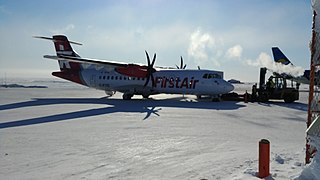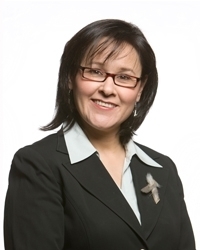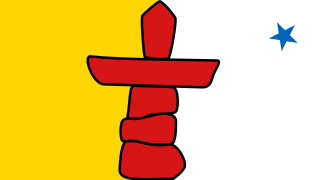Related Research Articles

Iqaluit is the capital of the Canadian territory of Nunavut. It is the territory's largest community and its only city. It was known as Frobisher Bay from 1942 to 1987, after the large bay on the coast on which the city is situated. The northernmost city in Canada, its traditional Inuktitut name was restored in 1987.

Bradley Air Services Limited, operating as First Air, was an airline headquartered in Kanata, a suburb of Ottawa, Ontario, Canada. It operated services to 34 communities in Nunavut, Nunavik, and the Northwest Territories. First Air has assisted in various humanitarian missions such as the 2010 Haiti earthquake, airlifting relief supplies and equipment. Its main base, which included a large hangar, cargo and maintenance facility, was located at Ottawa Macdonald–Cartier International Airport, with hubs at Iqaluit Airport, and Yellowknife Airport. On November 1, 2019, the airline consolidated operations with Canadian North.

The Legislative Assembly of Nunavut is the legislative assembly for the Canadian territory of Nunavut. The seat of the Assembly is the Legislative Building of Nunavut in Iqaluit.

Bradley Air Services, operating as Canadian North, is a wholly Inuit-owned airline headquartered in Kanata, Ontario, Canada. It operates scheduled passenger services to communities in the Northwest Territories, Nunavut and the Nunavik region of Quebec, as well as southern destinations such as Edmonton, Montreal and Ottawa.

Iqaluit Airport serves Iqaluit, Nunavut, Canada and is located adjacent to the city. It hosts scheduled passenger service from Ottawa, Montreal, Rankin Inlet, and Kuujjuaq on carriers such as Canadian North, and from smaller communities throughout eastern Nunavut. It is also used as a forward operating base by the Royal Canadian Air Force (RCAF). In 2011, the terminal handled more than 120,000 passengers.
Ann Meekitjuk Hanson was the third commissioner of Nunavut. She served from April 21, 2005, until April 10, 2010. Hanson, like all Inuit born between the 1940s and the 1970s, was labelled with a disc number by the Government of Canada, which, in her case was E7-121.

Nunatsiaq News is a Canadian weekly newspaper in operation since 1973 based in Iqaluit, serving Nunavut and Nunavik, in Kativik, Nord-du-Québec. The paper is published every Friday by Nortext Publishing Corporation of Iqaluit and Ottawa, and bears a retail price of C$1. Co-op stores in Nunavut and Nunavik distribute it for free.
Tagak Curley is an Inuit leader, politician and businessman from Nunavut. As a prominent figure in the negotiations that led to the creation of Nunavut, Tagak is considered a living father of confederation in Canada. He was born in a hunting camp at Coral Harbour, Northwest Territories.

Leona Aglukkaq is a Canadian politician. She was a member of the non-partisan Legislative Assembly of Nunavut representing the riding of Nattilik from 2004 until stepping down in 2008; then was a Conservative Member of Parliament representing the riding of Nunavut after winning the seat in the 2008 federal election. She was the first Conservative to win the seat, and only the second centre-right candidate ever to win it. Leona Aglukkaq is the first Inuk woman to serve in cabinet. She remained an MP until she was defeated in the 2015 federal election by Liberal candidate Hunter Tootoo. Aglukkaq unsuccessfully contested the 2019 federal election.

The Legislative Building of Nunavut is a structure in Iqaluit, Nunavut, Canada that serves as the seat of the Legislative Assembly of Nunavut. Designated Building 926, it consists of a three-storey glass and wood structure with a two-storey assembly hall.
Elections Nunavut is an independent agency that oversees elections and plebiscites in Nunavut, including:

Nunavut is the largest and northernmost territory of Canada. It was separated officially from the Northwest Territories on April 1, 1999, via the Nunavut Act and the Nunavut Land Claims Agreement Act, which provided this territory to the Inuit for independent government. The boundaries had been drawn in 1993. The creation of Nunavut resulted in the first major change to Canada's political map in half a century since the province of Newfoundland was admitted in 1949.
Elisapee Sheutiapik is a Canadian politician, who served as mayor of Iqaluit, Nunavut, from 2003 to 2010, and was elected to the Legislative Assembly of Nunavut in the 2017 general election.

Eva Qamaniq Aariaka is a Canadian Inuk politician, who was elected in the 2008 territorial election to represent the electoral district of Iqaluit East in the Legislative Assembly of Nunavut. She was subsequently chosen as the second premier of Nunavut, under the territory's consensus government system, on November 14, 2008. Aariak was the fifth woman to serve as a premier in Canada.

Apex is a small community in Iqaluit located on Baffin Island in Nunavut, Canada. It is about 5 km (3.1 mi) southeast of Iqaluit on a small peninsula separating Koojesse (Kuujussi) Inlet from Tarr Inlet. Historically Apex was the place where most Inuit lived when Iqaluit was a military site and off-limits to anyone not working at the base. The community is accessed by bridge or causeway, and bordered by a local creek (kuujuusi) and waterfall (kugluktuk). Located here are the women's shelter, a church, Nanook Elementary School, and a bed-and-breakfast, along with housing for about 60 families.
The Human Rights Act 2003 (Act) is an Act of the Legislative Assembly of Nunavut, the majority of which came into effect on November 5, 2004. The stated purposes of the Act are "to acknowledge within the framework of Inuit Qaujimajatuqangit that the Government, all public agencies, boards and commissions and all persons in Nunavut have the responsibility to guarantee that every individual in Nunavut is afforded an equal opportunity to enjoy a full and productive life and that failure to provide equality of opportunity threatens the development and well-being of all persons in the community." The Act explicitly does not affect any protections provided for by the Nunavut Land Claims Agreement. A notable achievement of this legislation was to end Nunavut's status as the only jurisdiction in Canada without protections for gay, lesbian and bisexual residents against discrimination.

The 2013 Nunavut general election was held October 28, 2013, to elect 22 members to the 4th Legislative Assembly of Nunavut. In November 2012 the assembly passed the Nunavut Elections Act 2012, stating that the writs for election drop September 23, 2013, and an election be held October 28, 2013, the proclamation was registered November 9, 2012. At the 2013 forum, held on November 15, 2013, Peter Taptuna was selected as the new Premier of Nunavut.

Simonie Michael was a Canadian politician from the eastern Northwest Territories who was the first Inuk elected to a legislature in Canada. Before becoming involved in politics, Michael worked as a carpenter and business owner, and was one of very few translators between Inuktitut and English. He became a prominent member of the Inuit co-operative housing movement and a community activist in Iqaluit, and was appointed to a series of governing bodies, including the precursor to the Iqaluit City Council.

The COVID-19 pandemic in Nunavut is an ongoing viral pandemic of coronavirus disease 2019 (COVID-19), a novel infectious disease caused by severe acute respiratory syndrome coronavirus 2 (SARS-CoV-2).
References
- 1 2 Bell, Jim (December 17, 2004). "Iqaluit bus stops running Jan. 10". Nunatsiaq News. Iqaluit: Nortext Publishing Corporation. Retrieved December 30, 2010.
- 1 2 3 4 "Iqaluit cuts $17-a-ride bus service". CBC News . December 14, 2007. Retrieved December 30, 2010.
- ↑ Rideout, Denise (March 29, 2002). "Back on the Bus". Nunatsiaq News. Iqaluit, NU: Nortext Publishing Corporation. Retrieved December 30, 2010.
- ↑ "City pays off bus contractor". Nunatsiaq News. Iqaluit, NU: Nortext Publishing Corporation. February 11, 2005. Retrieved December 30, 2010.
- ↑ Zarate, Gabriel (December 10, 2010). "Iqaluit council candidates field questions at Dec. 7 debate". Nunatsiaq News. Iqaluit, NU: Nortext Publishing Corporation. Retrieved December 30, 2010.
- ↑ Pelletier, Jeff (2024-05-01). "Iqaluit bus service hopes to offer new way around town". www.nunatsiaq.com. Nunatsiaq News . Retrieved 2024-05-10.
- ↑ Wyatt, David. "Iqaluit, Nunavut Territory". All-Time List of Canadian Transit Systems. Retrieved April 24, 2020.